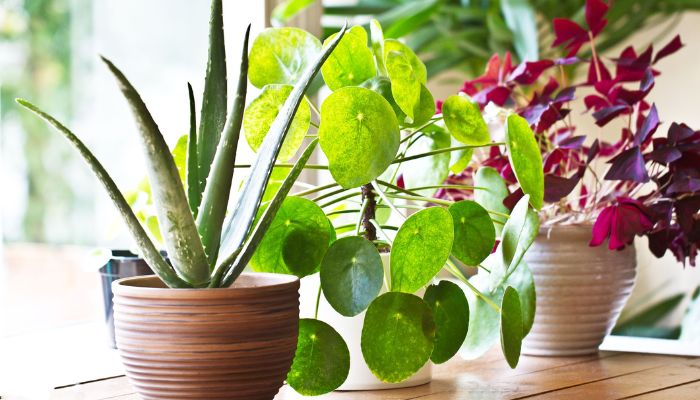As an indoor plant enthusiast and greenhouse owner for over 7 years, I’ve seen firsthand how nurturing plants can have a profoundly positive impact on mental health. After a stressful day, simply watering my lush green tropicals helps calm my mind. And many of my customers share how their plant collections have become therapeutic sanctuaries amid chaotic lives. Read on “How Do Indoor Plants Benefit Mental Health?”.
But why exactly do indoor plants boast so many mental health benefits? As a student of both horticulture and psychology at university, I’ve explored the science behind this phenomenon.
In this article, I’ll share 7 research-backed ways indoor plants can improve mental health, along with tips to maximize their positive effects.
Indoor Plants Benefit Mental Health In Many Ways
1. Indoor Plants Reduce Stress and Anxiety
Studies demonstrate that nurturing indoor plants helps lower the stress hormone cortisol and decrease anxiety. One theory is that because tending to plants requires focused attention and care, it brings our awareness to the present moment in an immersive “flow” state. This mindfulness practice distracts from worrying thoughts about the past or future.
I’ve also found that watering and pruning sessions give my anxious mind a mental break to reset. It’s much healthier than scrolling social media or snacking when I feel overwhelmed!
Tip: Group your plants together in a designated “calm zone” to transform the ritual of caring for them into an intentional mental health break.
2. They Improve Mood and Boost Happiness
Research reveals that indoor plants elevate mood, emotional well-being, and overall life satisfaction. In fact, a famous study found that hospital patients recovering from surgery healed faster and required less pain medication when their rooms contained plants.
I credit my Monstera and majestic Philodendron for brightening many gloomy days! Simply glimpsing their vibrant tropical leaves gives my mood an instant boost. And nurturing them provides a sense of purpose and self-esteem.
Tip: Add a few mood-boosting flowering plants like Orchids or Bromeliads. Their gorgeous blooms will make you smile!
3. Indoor Plants Reduce Fatigue and Energize
Studies demonstrate that spending just 30 minutes gardening combats fatigue by up to three times more than relaxing or reading indoors. This is likely because tending to plants gently raises heart rate and blood pressure, elevating mood through exercise. The life force energy emitted by live plants may also play a role.
I’ve found my Areca palm and vibrant Crotons banish exhaustion, especially on gloomy winter days. And caring for my exotic tropicals gives both my body and mind an energizing lift.
Tip: Place a few revitalizing plants like nerve plants, prayer plants or Areca palms in rooms where you work or study. Nurture them when you need an energy boost!
4. They Improve Concentration and Focus
Research reveals that indoor plants boost concentration, performance and focus by up to 30%! Just glimpsing live plants stimulates the release of neurotransmitters that enhance attention span.
As a university student, I always kept a few succulents on my desk during exam season. Their bright colors and interesting shapes helped keep my mind energized and focused while studying. And watering them during breaks offered a brain boost!
Tip: Add some round succulents, air plants or cacti to your workspace to harness plants’ power to sharpen focus.
5. Plants Reduce Headaches and Eye Strain
Studies show that nurturing indoor plants can reduce headaches and eye strain. Tending to plants gives eyes a break from screens and artificial lighting. And live plants emit negative ions that clear sinuses, elevate mood and banish pain.
I used to get terrible migraines from staring at screens for my office job. But filling my workspace with low-light tropicals like ferns and Calatheas gave my eyes a rejuvenating retreat. Glimpsing their vibrant leaves between tasks has nearly eliminated my headaches.
Tip: Add some low-light plants like Pothos, Philodendrons or Prayer Plants near computer workstations. Nurture them to ease eye fatigue and prevent headaches.
6. Indoor Plants Improve Sleep Quality
Research demonstrates that keeping plants in the bedroom significantly improves sleep quality. Live plants emit air-purifying compounds while resting at night, allowing more oxygen absorption for deeper sleep. Their tranquil presence also reduces the anxiety that keeps people awake.
On stressful nights, gazing at the moonlight shimmering on my bedroom Snake Plant and Pothos leaves calms my mind for restful sleep. And waking up to their vibrant green hues energizes me all morning!
Tip: Add a few low-light plants like Pothos, Philodendrons, or ZZ Plants to your bedroom. Their nighttime air purification creates optimal sleep conditions.
7. Plants Reduce Loneliness and Improve Relationships
Studies show that nurturing plants helps ease loneliness and emotional isolation. The ritual caretaking involved in watering, pruning and feeding plants provides comfort and purpose during solitary times. And gifting “plant babies” strengthens social bonds.
As an empty nester, tending to my indoor oasis gave me much-needed purpose. And sharing clippings from my Pilea, Monstera and Philodendrons with friends has brought us closer. My plants feel like dear companions that lend beauty, joy and meaning to life.
Tip: Bond with others by starting a weekly garden club. Share plant care tips and clippings while socializing over tea with close friends.
Maximize the Mental Health Benefits of Indoor Plants
Now that you know the myriad ways indoor plants can improve mental health, it’s time to start filling your home with these healing green friends!
I suggest creating a designated plant care space for maximum therapeutic benefits. This might be a bright, peaceful corner with a comfy chair for watering and pruning sessions.
Be sure to add mood-boosting flowering plants, air-purifying varieties, and concentration-sharpening succulents to rooms where you need an extra mental health boost.
The most important tip is to intentionally interact with your plants daily as part of a self-care routine. Water and prune them as a mindfulness exercise to reduce anxiety, elevate your mood, and energize your mind.
Soon, you’ll experience firsthand how nurturing indoor plants can profoundly benefit mental health, just like I have in my 7 years as a plant wellness enthusiast and greenhouse owner. I hope you find “How Do Indoor Plants Benefit Mental Health?” helpful.
So grab a monstera, relax in your comfy plant chair, and welcome the healing power of houseplants into your life!

Katia Hougaard is a PhD candidate at Imperial College London, specializing in plant-aphid interactions. With a background in Plant Biology from the University of Texas at Austin, she focuses on the genetic and physiological resistance of Medicago truncatula to pea aphids. Katia has served as a science advisor for startups in vertical farming and the houseplant industry. She also mentors students and manages a research lab, contributing her expertise to both academic and entrepreneurial projects. At SuperbPlants.com, Katia shares her in-depth knowledge of plant biology, emphasizing sustainable practices and scientific integrity.






